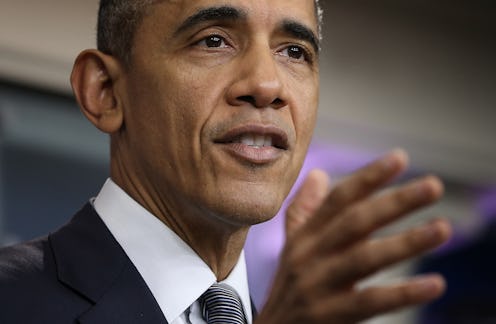News
President Obama's Hiroshima Visit Stirs Emotions
President Obama will do something that 11 of his predecessors have avoided: Visit the site of one of the atomic bomb blasts that ended World War II and saved tens of thousands of American soldiers — or, depending on the point of view, needlessly killed thousands of Japanese citizens, including kids, and leaving a generation to suffer from radiation poisoning. Decades of separate interpretations of the bombing will come to a head when Obama visits Hiroshima this month. The dramatic moment is part of a larger visit to the country for the Group of Seven summit meeting; the president is expected in the city May 27.
Some survivors of the blast welcome Obama's visit; they say they hope it will curb nuclear proliferation. One 82-year-old survivor, Reiko Yamada, told The Wall Street Journal that she wants him to hear stories like hers. She was knocked down by the blast as she was running towards a shelter. "I saw bodies, and there were parents who lost their children, and children who never saw their parents again after that day," she told the paper. She hopes Obama will pledge that such a tragedy never occurs again. "I think it's more important and crucial that he pledges to help build a world free of nuclear weapons," she said.
In the United States, Obama has been criticized by veterans groups for the move. They are afraid it will be seen by the Japanese as an apology, and they want the Japanese to first apologize for the treatment of American prisoners of war during the conflict — many died of abuse and starvation in Japanese prisons. The current Japanese Prime Minister Shinzo Abe has been accused by the same groups as covering up Japan's WWII history. More than 20 million were killed across Asia as a result of Japan's wartime violence.
"Abe and his administration have been working since taking office to replace the established history of Japan's abuses during the war with a denier's view," wrote Jan Thompson, the president of a POW support group called the American Defenders of Bataan and Corregidor Memorial Society, in a letter to Obama in April. He said that Obama's visit will give Abe a blank check to continue and negate the purpose of his visit, "which is to remind us all that we are capable of both good and bad."
The White House has reiterated that his visit is not to be interpreted as an apology. "If people do interpret it that way, they'll be interpreting it wrongly," said White House press secretary Josh Earnest. The visit will be looking to the future instead. "The president intends to visit to send a much more forward-looking signal for his ambition of realizing the goal of a planet without nuclear weapons," Earnest said.
About 80,000 people were killed when the U.S. dropped an atomic bomb on Hiroshima on Aug. 6, 1945, and thousands more died by the end of that year as result of the bombing. A second attack took place in Nagasaki three days later when the then-Japanese emperor did not immediately surrender, killing about 40,000. As of March 2015, there were about 180,000 Japanese survivors of the two attacks still living.
If Obama's visit can prevent such a horror from recurring — as opposed to Trump, who has called on Japan and South Korea to develop their own nuclear weapons — the world will be a safer place.
